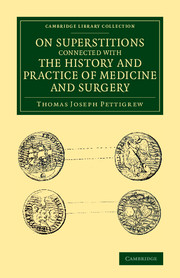Refine search
Actions for selected content:
12661 results in History of science
Appendix B - Bibliography of the Didinœ
-
- Book:
- The Dodo and its Kindred
- Published online:
- 05 June 2015
- Print publication:
- 01 January 2015, pp 127-134
-
- Chapter
- Export citation
Frontmatter
-
- Book:
- The Dodo and its Kindred
- Published online:
- 05 June 2015
- Print publication:
- 01 January 2015, pp i-iv
-
- Chapter
- Export citation
Introduction
- from PART I - History and external characters of the Dodo, Solitaire, and other Brevipennate birds of Mauritius, Rodriguez, and Bourbon
-
- Book:
- The Dodo and its Kindred
- Published online:
- 05 June 2015
- Print publication:
- 01 January 2015, pp xi-xiv
-
- Chapter
- Export citation
Appendix A - Translations of foreign extracts in Part I
-
- Book:
- The Dodo and its Kindred
- Published online:
- 05 June 2015
- Print publication:
- 01 January 2015, pp 123-126
-
- Chapter
- Export citation
Index
-
- Book:
- The Dodo and its Kindred
- Published online:
- 05 June 2015
- Print publication:
- 01 January 2015, pp 139-141
-
- Chapter
- Export citation
PART II - Osteology of the Dodo and Solitaire
-
- Book:
- The Dodo and its Kindred
- Published online:
- 05 June 2015
- Print publication:
- 01 January 2015, pp 67-68
-
- Chapter
- Export citation
PART I - History and external characters of the Dodo, Solitaire, and other Brevipennate birds of Mauritius, Rodriguez, and Bourbon
-
- Book:
- The Dodo and its Kindred
- Published online:
- 05 June 2015
- Print publication:
- 01 January 2015, pp ix-x
-
- Chapter
- Export citation
Postscript to Part II
-
- Book:
- The Dodo and its Kindred
- Published online:
- 05 June 2015
- Print publication:
- 01 January 2015, pp 120-122
-
- Chapter
- Export citation
Chap. I - The Brevipennate Bird of Mauritius, the DODO
- from PART I - History and external characters of the Dodo, Solitaire, and other Brevipennate birds of Mauritius, Rodriguez, and Bourbon
-
- Book:
- The Dodo and its Kindred
- Published online:
- 05 June 2015
- Print publication:
- 01 January 2015, pp 7-45
-
- Chapter
- Export citation
Chap. III - Brevipennate Birds of the Isle of Bourbon
- from PART I - History and external characters of the Dodo, Solitaire, and other Brevipennate birds of Mauritius, Rodriguez, and Bourbon
-
- Book:
- The Dodo and its Kindred
- Published online:
- 05 June 2015
- Print publication:
- 01 January 2015, pp 57-62
-
- Chapter
- Export citation
Contents
- from PART I - History and external characters of the Dodo, Solitaire, and other Brevipennate birds of Mauritius, Rodriguez, and Bourbon
-
- Book:
- The Dodo and its Kindred
- Published online:
- 05 June 2015
- Print publication:
- 01 January 2015, pp xv-xvi
-
- Chapter
- Export citation
Chap. II - The Brevipennate Bird of Rodriguez, the SOLITAIRE
- from PART I - History and external characters of the Dodo, Solitaire, and other Brevipennate birds of Mauritius, Rodriguez, and Bourbon
-
- Book:
- The Dodo and its Kindred
- Published online:
- 05 June 2015
- Print publication:
- 01 January 2015, pp 46-56
-
- Chapter
- Export citation
Chap. I - Osteology of the Dodo
- from PART II - Osteology of the Dodo and Solitaire
-
- Book:
- The Dodo and its Kindred
- Published online:
- 05 June 2015
- Print publication:
- 01 January 2015, pp 71-112
-
- Chapter
- Export citation
ERRATA
-
- Book:
- The Dodo and its Kindred
- Published online:
- 05 June 2015
- Print publication:
- 01 January 2015, pp 142-142
-
- Chapter
- Export citation
List of Subscribers
-
- Book:
- The Dodo and its Kindred
- Published online:
- 05 June 2015
- Print publication:
- 01 January 2015, pp vii-viii
-
- Chapter
- Export citation
Explanation of the plates
-
- Book:
- The Dodo and its Kindred
- Published online:
- 05 June 2015
- Print publication:
- 01 January 2015, pp 135-138
-
- Chapter
- Export citation
Postscript to Part I
- from PART I - History and external characters of the Dodo, Solitaire, and other Brevipennate birds of Mauritius, Rodriguez, and Bourbon
-
- Book:
- The Dodo and its Kindred
- Published online:
- 05 June 2015
- Print publication:
- 01 January 2015, pp 63-66
-
- Chapter
- Export citation
Introduction
- from PART II - Osteology of the Dodo and Solitaire
-
- Book:
- The Dodo and its Kindred
- Published online:
- 05 June 2015
- Print publication:
- 01 January 2015, pp 69-70
-
- Chapter
- Export citation
Dedication
-
- Book:
- The Dodo and its Kindred
- Published online:
- 05 June 2015
- Print publication:
- 01 January 2015, pp v-vi
-
- Chapter
- Export citation

On Superstitions Connected with the History and Practice of Medicine and Surgery
-
- Published online:
- 18 December 2014
- Print publication:
- 17 July 2014
- First published in:
- 1844
